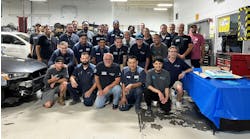Don't bury deductibles or you could be committing insurance fraud
There's always one sure sign at our shop that our local economy is struggling: We see a spike in the number of people asking us to "cover" or "bury" their deductible.
I know that's a much more regular occurrence year-in and year-out in some markets. I know some shops without many other marketing ideas use "covering the deductible" as a sales tool.
But it's just not something we're willing to do. I'm not an attorney, and laws vary by state, so I won't argue that the practice is illegal. But to me, it just doesn't seem like an ethical or wise practice even just from a business sense.
If, for whatever reason, you share my shop's decision to refuse to "cover" or "bury" deductibles, here are some tools and techniques we've developed over the years to help us respond to customer questions about deductibles.
First, we explain to the customers that their insurance policy is a contract between them and their insurer. In order to collect under that policy, it requires that they do certain things, including paying the first $250 (or whatever their deductible is) of the loss.
"If we absorb your deductible, we could be placing you in a position of committing fraud against your insurer," we tell the customer. "We will not do this to you, and we will not cheat you or your insurer, period. Our recommendation is to carefully consider whether you want to do business with someone who thinks it's okay to help you commit fraud. If a business is willing to cheat an insurer, couldn't they just as likely be willing to cheat you?"
We explain that based on our decades of experience in this industry, the only way a shop these days can find a way to bury today's high deductibles (which are often 25 or 50 percent of the entire repair cost) and still make money is to inflate prices to the insurer or to cut corners on the repair. Those aren't practices we are willing to collude with any vehicle-owner to do.
We also may point out that working with a shop that conspires to "bury" the deductible may leave vehicle owners few options if they end up being unhappy with the work or service they receive. Their insurer or any agency they turn to for assistance may be apt to tell them they "got what they paid for" if they end up with a substandard repair by saving their deductible.
We, of course, also encourage the vehicle owner to protect their investment by choosing a first-class repairer for a first-class repair. That's when having good selling skills and an ability to sell on factors other than cost alone come into play. I often think if the shops burying deductibles instead put a little bit of that money toward sales training they wouldn't have to keep relying on the practice in order to get work.
If there's someone who clearly is unable or unwilling to pay their deductible, there may be options for them. If there are some aspects of the repair they decide they don't want to have done – and we can forego doing that without compromising the safety of the vehicle or the terms of their insurance contract – that's an option we will discuss with them. But if they want a complete repair backed up by our warranty, paying the deductible is required.
If you belong to a trade association, you probably agreed to abide by a code of ethics. If you find yourself or any of your staff getting tempted on the deductible issue, get out that code and review it. Don't let tough times lead you into the "deductible" game, and you'll make it through this downturn with your integrity intact.



